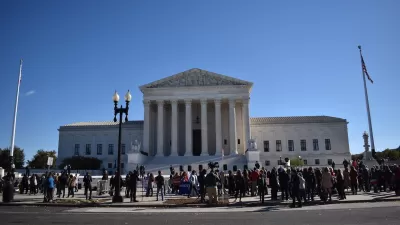A California property owner took El Dorado County to state court after paying a traffic impact fee he felt was exorbitant. He lost in trial court, appellate court, and the California Supreme Court denied review. Then the U.S. Supreme Court acted.

In a 9-0 court decision on April 12, the U.S. Supreme Court "ruled that developers and home builders in California may challenge the fees commonly imposed by cities and counties to pay for new roads, schools, sewers and other public improvements," reported David G. Savage for the Los Angeles Times on April 12.
[Related: "California Impact Fees Reach Supreme Court," October 4, 2023]
Background
"The case arose when property owner George Sheetz sought a permit to put a manufactured home on a lot he owned in Placerville, outside Sacramento. El Dorado County required him to pay a “traffic impact mitigation” fee to obtain the permit," adds Savage. The fee was $23,420.
Some of the money was to go toward upgrades to Highway 50, which runs through the area, but most was to go toward new or expanded roads in the county.
At issue is how to view impact fees, "payments required by local governments of new development for the purpose of providing new or expanded public capital facilities required to serve that development," according to an American Planning Association policy guide ratified in April 1997, and their relationship with the Takings Clause of the Fifth Amendment of the U.S. Constitution.
Can impact fees be considered a "taking" if inappropriately applied?
Savage continues:
Writing for the court in Friday’s ruling [pdf], conservative Justice Amy Coney Barrett said that “there is no basis for affording property rights less protection in the hands of legislators than administrators. The Takings Clause applies equally to both — which means that it prohibits legislatures and agencies alike from imposing unconstitutional conditions on land-use permits.”
JD Supra, a leading resource for law firms, explained the ruling in similar terms in the first paragraph of their summary of the decision:
On April 12, 2024, the United States Supreme Court decided Sheetz v. El Dorado County, No. 22-1074, holding that the Takings Clause “does not distinguish between legislative and administrative permit conditions,” but instead “prohibits legislatures and agencies alike from imposing unconstitutional conditions on land-use permits.”
The article adds that Sheetz paid the fee but claimed that it "constituted an unlawful 'exaction' of money in violation of the Takings Clause."
Yes, California's impact fees have been shown to be excessive, according to a related post:
What's needed?
Savage of the the Times spoke with state Sen. Scott Wiener ( D-San Francisco), author some of the state's most far-reaching housing legislation, regarding the decision.
“Ultimately, the solution is the same today as it was yesterday,” Wiener said. “The California Legislature needs to put in place an actual structure for impact fees. Right now, it’s all over the map.”
As for Mr. Sheetz, it's back to state court, as Justice Barrett directed at the end of the majority opinion:
The judgment of the California Court of Appeal is vacated, and the case is remanded for further proceedings not inconsistent with this opinion.
It is so ordered.
Additional reading, related posts:
- San Mateo Daily Journal: SCOTUS ruling upends how cities charge development impact fees regionally and statewide, Apr 13, 2024
- Planning Report: Nollan-Dolan "Taking" Doctrine: Landmark Supreme Court Cases? August 30, 1994
- Justice Scalia and the Takings Clause, February 18, 2016
- U.S. Supremes Tighten the Screws on Exactions, June 26, 2013
FULL STORY: Builders may fight ‘impact fees’ that fund municipal projects in California, Supreme Court rules

Planetizen Federal Action Tracker
A weekly monitor of how Trump’s orders and actions are impacting planners and planning in America.

Chicago’s Ghost Rails
Just beneath the surface of the modern city lie the remnants of its expansive early 20th-century streetcar system.

San Antonio and Austin are Fusing Into one Massive Megaregion
The region spanning the two central Texas cities is growing fast, posing challenges for local infrastructure and water supplies.

Since Zion's Shuttles Went Electric “The Smog is Gone”
Visitors to Zion National Park can enjoy the canyon via the nation’s first fully electric park shuttle system.

Trump Distributing DOT Safety Funds at 1/10 Rate of Biden
Funds for Safe Streets and other transportation safety and equity programs are being held up by administrative reviews and conflicts with the Trump administration’s priorities.

German Cities Subsidize Taxis for Women Amid Wave of Violence
Free or low-cost taxi rides can help women navigate cities more safely, but critics say the programs don't address the root causes of violence against women.
Urban Design for Planners 1: Software Tools
This six-course series explores essential urban design concepts using open source software and equips planners with the tools they need to participate fully in the urban design process.
Planning for Universal Design
Learn the tools for implementing Universal Design in planning regulations.
planning NEXT
Appalachian Highlands Housing Partners
Mpact (founded as Rail~Volution)
City of Camden Redevelopment Agency
City of Astoria
City of Portland
City of Laramie





























